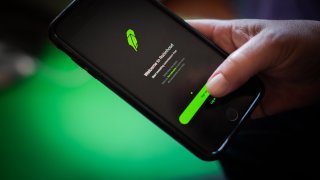
- Online broker Robinhood said that it put temporary buying restrictions on a small number of securities because central Wall Street clearinghouse-mandated deposit requirements for equities increased tenfold.
- "It was not because we wanted to stop people from buying these stocks," Robinhood said in a blog post published late Friday.
- Amateur investors using Robinhood and other apps bid up heavily shorted stocks and caused GameStop shares to skyrocket 400% in the past week.
Online broker Robinhood said that it put temporary buying restrictions on a small number of securities because central Wall Street clearinghouse-mandated deposit requirements for equities increased tenfold.
The decision by Robinhood, a free-trading pioneer and app that's popular among small investors, drew scrutiny from its customers over the past week.
"It was not because we wanted to stop people from buying these stocks," Robinhood said in a blog post published late Friday.
"We did this because the required amount we had to deposit with the clearinghouse was so large — with individual volatile securities accounting for hundreds of millions of dollars in deposit requirements — that we had to take steps to limit buying in those volatile securities to ensure we could comfortably meet our requirements," it continued.
Amateur investors using Robinhood and other apps bid up heavily shorted stocks and caused GameStop shares to skyrocket 400% in the past week, resulting in major losses for hedge funds who shorted the shares.
Robinhood initially told investors they could only sell and not buy new shares in certain companies that were attracting attention from retail traders on Reddit. The online brokerage is now allowing clients to buy only a single share of GameStop. A total of 50 securities are now restricted on the stock trading app.






